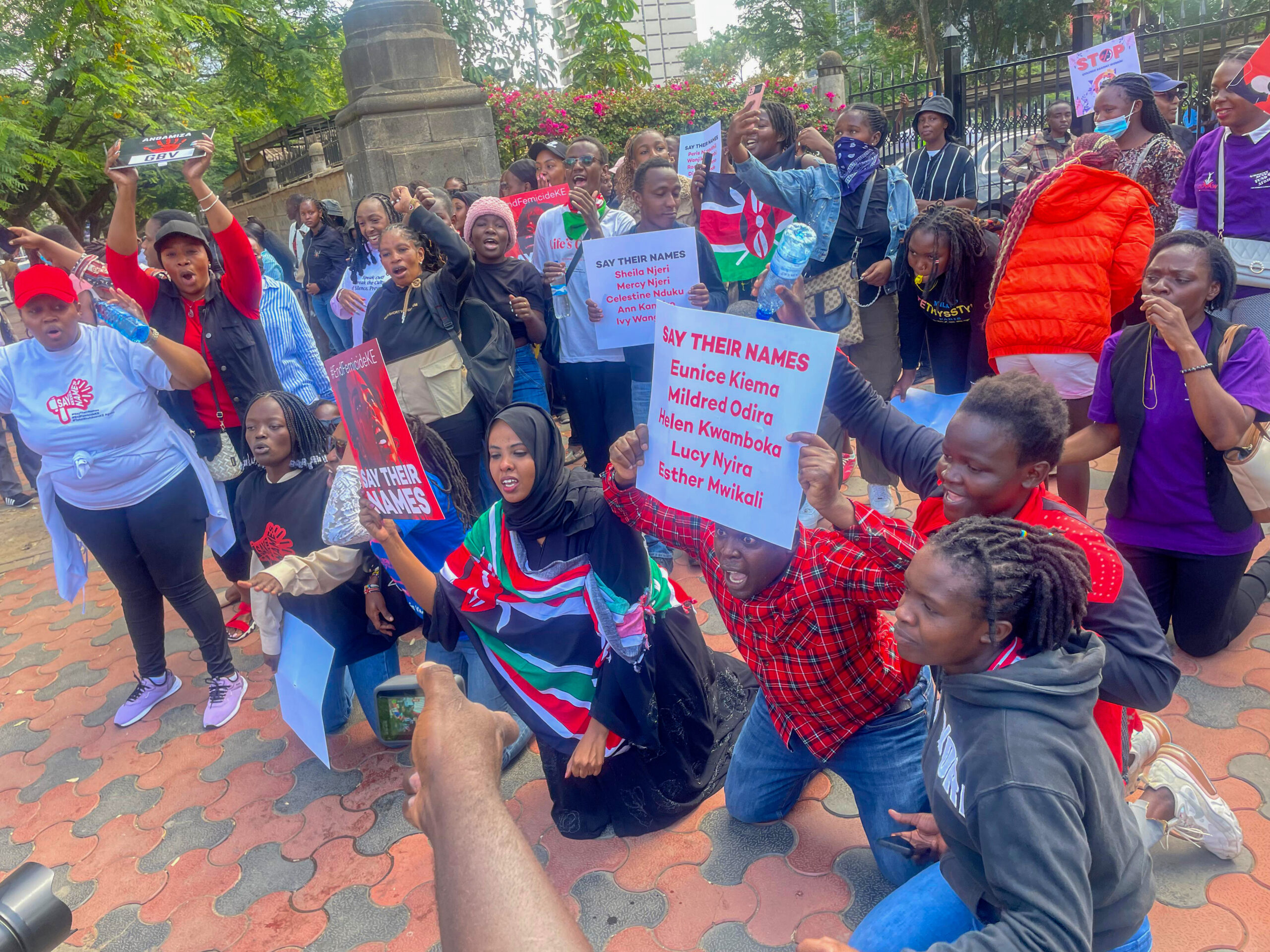Women-led protests demanding justice and an end to femicide highlight the growing agency of youthful African women. Protesters are calling for social order, better governance and an end to the violence against, and killings of, women.
By Bonface Orucho
Thousands of women took to the streets in Kenya on Tuesday (December 10), raising their voices in solidarity against the rising tide of women killings in the country.
Youth groups led thunderous chants in Nairobi with placards bearing messages of resilience and defiance as they marched under the banner of #EndFemicide, calling for justice, accountability, and the protection of women’s rights.
“Women are dying… According to statistics, a woman dies every day due to violence against women. We are totally against it,” one protestor stated in an interview on the streets of Nairobi.
The demonstrations, spanning multiple cities, were driven by a troubling surge in violence-related deaths targeting women. According to Kenyan police reports, as of November 25, at least 97 women were reported killed in the past three months, a statistic that has sparked nationwide outrage and calls for immediate action to address the crisis.
According to activists, a holistic community-led approach is essential to combating femicide and the root causes of gender-based violence. They emphasise the need for education, awareness campaigns, legal reforms, and the empowerment of women and girls.
Elijah Rotok, the senior human rights officer in charge of reforms and accountability at the Kenya National Commission on Human Rights, explained in a press statement on November 26 that “women in the public eye (including those in politics), women human rights defenders, and journalists are often targets of intentional acts of violence, both online and offline.”
“We all have a role to play in ending violence against women and girls in the society. To effectively combat gender-based violence, we need to understand the issue,” he explained.
Protests in Kenya coincide with the 2024 commemoration of the 16 Days of Activism against Gender-Based Violence, an annual global campaign running from November 25 (International Day for the Elimination of Violence Against Women) until December 10 (Human Rights Day).
The 2024 theme, ‘Towards Beijing +30: UNiTE to End Violence Against Women and Girls,’ calls for a renewed commitment to gender equality. The UNiTE campaign urges states, private sector entities, and other duty-bearers to prioritise accountability, resources, and action as the world marks 30 years since the adoption of the Beijing Platform for Action and its Political Declaration.
Violence against women and girls remains the most widespread human rights violation globally, according to the UN.
Globally, nearly one in three women—an estimated 736 million—have endured physical and/or sexual violence, whether from an intimate partner, a non-partner, or both, at some point in their lives. Alarmingly, in the past year alone, one in eight women and girls aged 15-49 has experienced intimate partner violence, according to UN Women.
Africa remains hugely affected, with a 2023 Afrobarometer research across 39 countries in Africa showing that four out of ten respondents reported a high prevalence of GBV in their communities.
However, African states continue to make significant strides in tackling GBV. For instance, fifty-two nations have ratified the Convention on the Elimination of All Forms of Discrimination Against Women (CEDAW), often referred to as the global bill of women’s rights.
Significant progress has been made in regions like Southern Africa, where several countries have demonstrated strong government commitment to ending GBV. For instance, Botswana has committed to reducing GBV rates among women from 37% to 20% and for men from 21% to 10%, with a National Strategy Toward Ending GBV, launched in 2019, driving this progress.
In February 2024, King Mswati III of Eswatini also called for cultural change and emphasised that tackling GBV is as critical as the national response to HIV/AIDS.
In the same month, South Africa’s President declared GBV the ‘second pandemic,’ urging collective efforts to address it through a multi-stakeholder National Strategic Plan.
Zimbabwe’s also passed into law the High-Level Political Compact in 2021, declaring GBV a national emergency and reaffirming commitment to its complete eradication by 2030.
The economic impact of GBV is far-reaching. According to the International Monetary Fund, a 1% increase in the number of women subjected to gender-based violence reduces national economic activities by up to 8%.
bird story agency
Protests led by African women, particularly in Kenya, highlight the urgent call to address femicide and gender-based violence. Demonstrations erupted in major cities under the hashtag #EndFemicide, driven by the alarming statistic that at least 97 women were killed over three months, sparking nationwide outrage. The protests align with the global 16 Days of Activism against Gender-Based Violence, calling for education, awareness, legal reforms, and women's empowerment as key strategies to curb the violence.
Activists and human rights officials emphasize the need for a collective approach to combat the widespread issue, which continues to affect nearly one in three women globally. African countries are making strides, with numerous states ratifying international agreements like CEDAW and implementing strategic plans to reduce and ultimately eliminate GBV. For example, Botswana aims to reduce GBV significantly by 2030, with similar commitments seen in Eswatini, South Africa, and Zimbabwe. Addressing GBV is not only a human rights issue but also an economic necessity, as its prevalence negatively impacts national economies.






